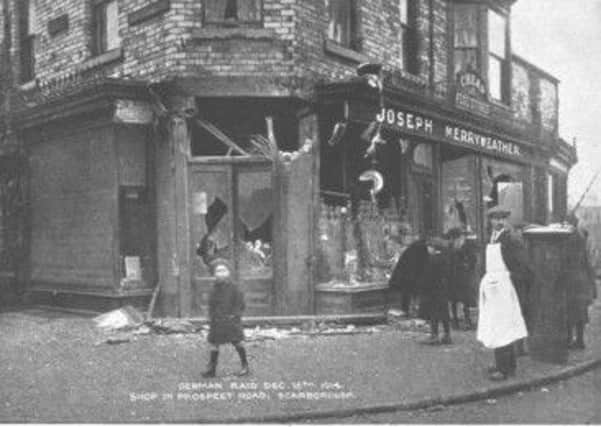Day when terror rained down on seaside towns


THE main story on page seven of the Leeds Mercury from December 17, 1914, is a piece entitled “Tending The Geranium”, which offers advice on how to encourage flowering and protect plants from the frost.
It is the type of lifestyle piece that would not look out of place today and it’s only when you glance at the page opposite and see a photograph accompanied by the headline “Scarborough Shop Wrecked by German Shell”, that the horror of war is brought home. The caption reads: “A shop in Prospect Road, occupied by Mr Merryweather, which was struck by a shell blowing out the shop front and killing Mrs Merryweather.”
Advertisement
Hide AdAdvertisement
Hide AdThe shop owner’s wife was among those who had been quietly going about their business when two dark shapes slipped through the morning mist on December 16, 1914, and unleashed a torrent of shells on the unsuspecting men, women and children in the seaside town. It was part of a devastating attack not only on Scarborough, but also further up the coast at Whitby and Hartlepool that left 122 dead and a nation in turmoil.
By now the war had been raging for more than four months and people had grown used to reading about the fierce battles being fought across The Channel. But the German raid brought the terror of this fledgling war directly into their homes and lives and, in some cases, ripped both of them apart.
The deadly attack was headline news, not just for local newspapers but the national Press, too. As the Leeds Mercury went to press the full scale of the devastation was still emerging. It ran with the headline “German Cruisers Shell East-Coast Towns And Escape”, putting the death count at “65” with “about 200” wounded – though both figures would end up higher.
The newspaper called the attack “deplorable” and carried numerous reports about some of those who had lucky escapes and others who weren’t so fortunate. The readers were not spared the grisly details. In Whitby, it was reported that a coastguard “had his head blown off” and a drayman employed by the North-Eastern Railway was killed by a shrapnel wound to the chest.
Advertisement
Hide AdAdvertisement
Hide AdThe newspaper reported a “lady bather’s” fortunate “escape” when the salvo began in Scarborough. “One young woman, staying in Cromwell Road, Scarborough, near the Trinity Church, reached the safety of Harrogate with her sister. She used to bathe early each morning with other women, and was on her way to the shore when the bombardment began. She hastened back to the house.
“A postman who called told them that a house on Westmoreland Grove has been struck and two men killed in South Street, where there was a pool of blood. They did not wait to have breakfast, but as soon as the cannonading ceased, they set out for the railway station and mingled with scores of others going in the same direction.”
The newspaper had reporters on the ground not just in the town itself but right across the county and even as far away as London, where they spoke to several survivors including a man who had just arrived at King’s Cross having been injured along with his son.
Arthur Wood was the head book-keeper of the Scarborough Electric Supply Company and lived at Hanover Road with his wife and son. “Both Mr Wood and his son Clifford, a lad about 12 years of age, had been wounded by fragments of shell and each had his head swathed in bandages.” The father was seriously injured, the paper reported, having lost a large amount of blood with his “waistcoat and vest being almost covered”.
Advertisement
Hide AdAdvertisement
Hide AdMr Wood described what he had seen to the reporter. “The bombardment, he estimates, lasted from half an hour to three-quarters of an hour.” He said that the two German cruisers were about tw o miles out to sea and although the sky was hazy they could clearly be seen from the shore.
“‘Both my son and myself were injured by the same shell. I was standing near a butcher’s shop, a few doors from my house, when the shell seemed to burst over my head. It actually took off the top of the butcher’s shop, and one of the fragments of the burst shell passed within a few inches of me, struck the window-sill and glanced on to my head. I was rendered partly unconscious by the blow and another portion struck my boy and inflicted a deep cut on his head.’”
His wife and son sought shelter in the cellar while he gathered a few essential belongings before they made their to the railway station. It was a scene repeated across the town as many people feared that an invasion was imminent and were desperate to get as far away from Scarborough as possible.
Mr Wood told the reporter that the east end of the town suffered the worst of the bombardment with a hundred homes up in flames. “‘Nearly all of the largest buildings in the town were affected in some way or other. Both the Balmoral Hotel and the Royal Hotel were struck, while nearly all the houses along the front sustained damage. As far as I could learn, all the best residential houses along the South Cliff have been riddled.
Advertisement
Hide AdAdvertisement
Hide Ad“‘One shell went through the house of Mr Beaforth, on the Esplanade – one of the largest houses in Scarborough – then passed clean through three other houses and landed in the Scarborough Bowling Gardens. Fortunately it did not kill anybody.’” He said that few places had escaped unscathed, adding: “‘There is hardly a window left in the whole of the town.’”